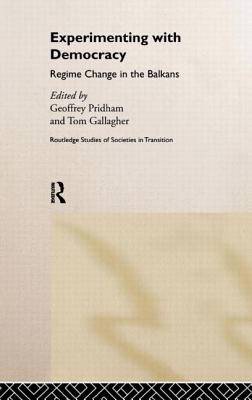
- Afhalen na 1 uur in een winkel met voorraad
- Gratis thuislevering in België vanaf € 30
- Ruim aanbod met 7 miljoen producten
- Afhalen na 1 uur in een winkel met voorraad
- Gratis thuislevering in België vanaf € 30
- Ruim aanbod met 7 miljoen producten
Experimenting With Democracy
Regime Change in the Balkans
Omschrijving
The chronic instability in the Balkan States of South East Europe has prevented the end of the Cold War becoming an era of genuine peace in Europe. Against a background of competing nationalisms, economic decline, the resilience of authoritarianism, it is easy to forget that there have been experiments with democracy have taken place since 1990 with relative success. Now, for the first time, the region is genuinely engaging with open politics; its outcome will determine whether the Balkans can cease being a byword for instability, and an area whose shock-waves have disturbed the peace of Europe on many occasions.
Democratisation in the Balkans explores the obstacles impeding the consolidation of democracy, and even preventing a state like Serbia from going very far down the democratic road. Social scientists with expert knowledge of each of the Balkan states, and their political and economic systems, examine why progress in building free institutions has been slow compared to that of Central Europe, the Iberian peninsula and Latin America.
Specificaties
Betrokkenen
- Uitgeverij:
Inhoud
- Aantal bladzijden:
- 294
- Taal:
- Engels
- Reeks:
- Reeksnummer:
- nr. 13
Eigenschappen
- Productcode (EAN):
- 9780415187268
- Verschijningsdatum:
- 14/10/1999
- Uitvoering:
- Hardcover
- Formaat:
- Genaaid
- Afmetingen:
- 161 mm x 236 mm
- Gewicht:
- 557 g

Alleen bij Standaard Boekhandel
Beoordelingen
We publiceren alleen reviews die voldoen aan de voorwaarden voor reviews. Bekijk onze voorwaarden voor reviews.










